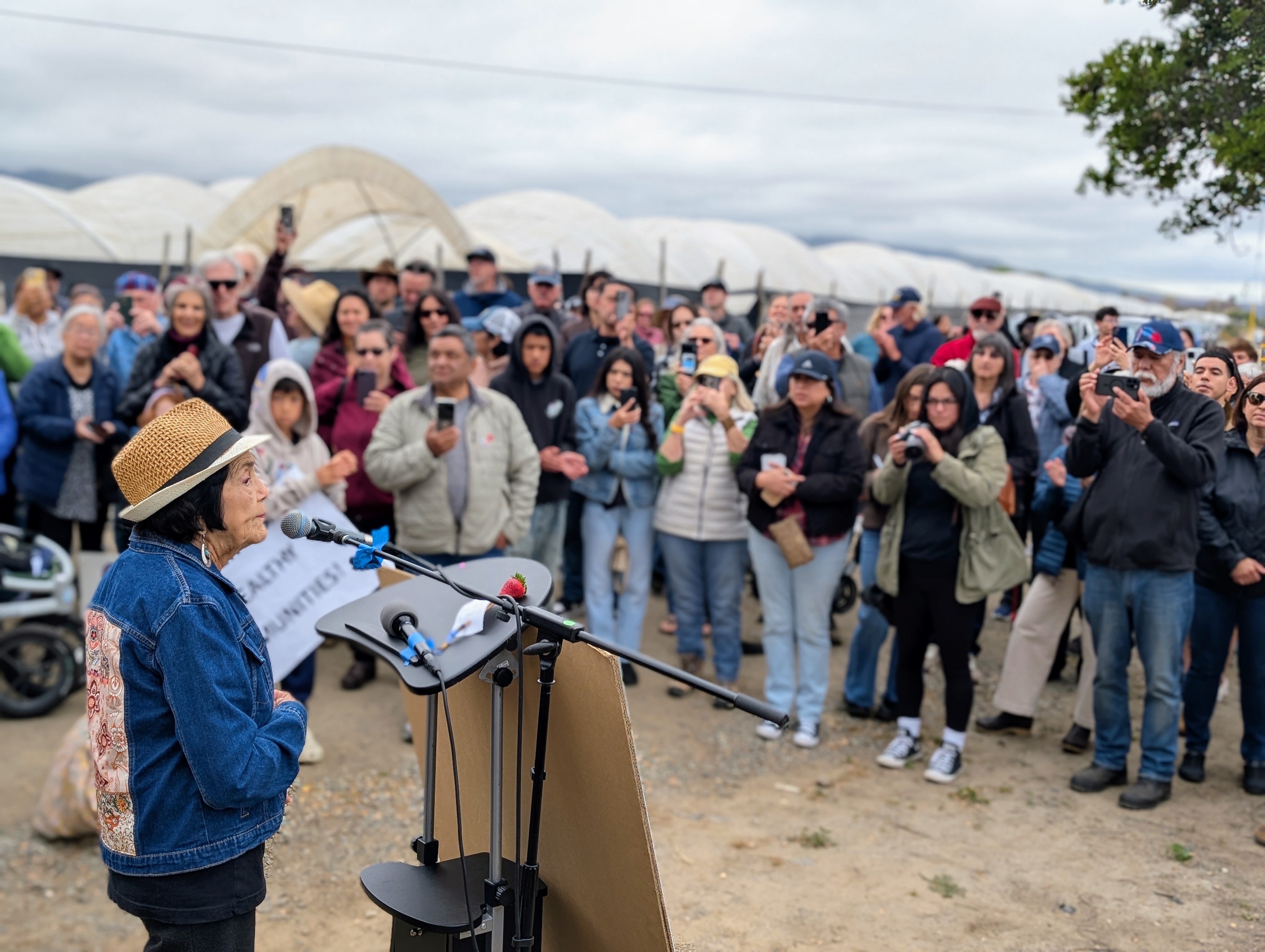
Sept. 30, 2025—Sometimes, after weeks without anything more than water and some bone broth, some shaking might start.
And knees could buckle.
And movement—even slow movement—demands a timeout.
With all that comes a bonus life ingredient that earns reflection from fleeting attention spans, as they observe a worthy cause.
Said ingredient: unique perspectives from braving a month without eating.
Here appear a few insights from talking with Omar Dieguez three different times over 30 days of his hunger strike—to protest pesticide use in the region and neighborhoods he calls home, and the life-choking effects he has seen fellow humans suffer from—ranging from the pithy to the profound, while he’s dropped at least 20 pounds:
1 • “[Students] ask about what I’ll eat first, or my favorite foods I miss. I have so many favorites. My mom’s chilaquiles. Cheesecake. Oh, cheesecake—I could eat a whole one on my own. I love a lot of food.”
2 • From Day 29: “I feel good, but there’s days where doing too many presentations or moving around too much where it’s like, ‘Hey man, I just need to sit down.’ I stood in front of student council at Cabrillo [College] and my knees almost gave out. ‘I need a moment to regroup.’”
3 • “It can be so disappointing to hear [high school administrations] say it’s ‘too controversial’ to talk about pesticides that affect their health…when most of students have immigrant heritage, and have farmworker parents. What are we teaching our kids?”
4 • “You can’t just jump into [fasting]—you have to ease into it—I went vegetarian, and plan on sticking with that. And you can’t jump into eating [after fasting]…your stomach will explode.”
5 • “Going to some of schools I’ve been allowed to go to, a lot of students come up after class. A lot share tears. They tell me the stories: ‘I live in the middle of a strawberry field and didn’t know who to talk to, now I can tell you what’s going on.’ Sharing how a grandfather or a grandma or an uncle died from it, or suffer from it, matters.”

6 • Day 30: “Some of things I’ve noticed is my senses are stronger now. I was a painter for a long time, and that affected my sense of smell. Now I can smell everything. I feel strong. I feel clear.”
7 • “I met some people who work at Driscoll’s* who don’t know I’m on the hunger strike, and I ask them ‘What do you think?’ They say Driscoll’s is very aware of the strike, and were asked by the company not to engage.”
*Every attempt I’ve made to talk with Driscoll’s reps about farmworker health or pesticide policy—from emailing its upper echelon leadership to calling its customer care line—has netted the same response: Refer to the statement on their website.
8 • “It’s gonna be a long battle. I think there’s a lot of momentum right now. More people are getting educated about it.”

9 • “We had a student, a young Brown Beret, age 16 or 17, who wanted to do the hunger strike with me. We knew [and told him], ‘Your brain needs nutrients when you’re developing!’ But the decision he took to make this statement is big. You think you’re not able to get students to recognize the power of their actions, and then you’re reminded.”
10 • “I’m also a Watsonville Brown Beret. I fought against methyl bromide, and living in my community, I’ve seen people suffer through cancers, respiratory illnesses, skin rashes, ADHD. I know farmworkers who deal with it and deal with it and talk about how to manage it all the time, because they’re looking [for resources].”
11 • “I’ve been getting people from across the United States reaching out to me. Organizations, groups, students, indigenous people, farmworkers. A lot of people knew about [pesticide health impacts] but didn’t know how to bring it to light, how to push for it. This campaign as a hunger strike helped them realize we need to get together and make this a big thing. It’s getting a lot of momentum.”
About the author
Mark C. Anderson, Edible Monterey Bay's managing editor, appears on "Friday Found Treasures" via KRML 94.7 every week, a little after 12pm noon. Reach him via mark@ediblemontereybay.com.
- Mark C. Andersonhttps://www.ediblemontereybay.com/author/markcanderson/
- Mark C. Andersonhttps://www.ediblemontereybay.com/author/markcanderson/
- Mark C. Andersonhttps://www.ediblemontereybay.com/author/markcanderson/
- Mark C. Andersonhttps://www.ediblemontereybay.com/author/markcanderson/



